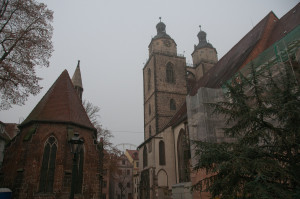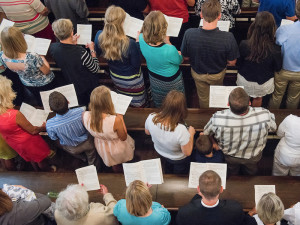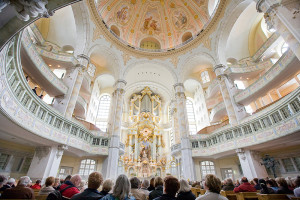by Rev. Mark Bestul

Simply put, the kingdom of the right is the Church, both in earth and heaven. In Luther’s On Temporal Authority, the reformer refers to this as “the kingdom of God.” Yet, we ought not understand this as if the kingdom of the left is not also under God’s rule; rather, we should take great comfort that the kingdom of the right is ruled by God in view of Christ. Whereas the kingdom of the world includes God’s temporal gifts of daily bread, so that the rain falls on Christian and non-Christian alike, the “kingdom of God” (i.e. kingdom of the right/the Church) exclusively benefits from God’s eternal gifts of the forgiveness of sins and life everlasting, as we confess in the Creed.
As the Church is the exclusive beneficiary of such gifts, we ought also to expect that the Church is “ruled” differently than the world. Unlike the world, which is ruled by Law, the Church is ruled by the Gospel,[1] so that grace and forgiveness is the “rule” of the kingdom of the right, with an undivided focus on Christ crucified: “Before God’s court only the righteousness of Christ’s obedience, suffering, and death – which is credited to faith – can stand.”[2] And in this “court” of God, this kingdom of His mercy, the Word and Sacraments are the means by which Christ rules so graciously and His Gospel “reigns” through the forgiveness of sins: “We must constantly maintain this point: God does not want to deal with us in any other way than through the spoken Word and the Sacraments.”[3]
Here we see the different “instruments” and “gifts” of each kingdom: while the kingdom of the left (including Christians, as we are members of both kingdoms) is given daily bread through the sweat of the brow, the charity of neighbors, the fruit of the earth, and good government, it is only the Church that, through Word and Sacraments, is given the forgiveness of sins. To be sure, unbelievers–that is, those who deny that Jesus died for their sins–can still say to one another, “I’m sorry” and “Please forgive me”, but only in the kingdom of the right, the kingdom of faith and the Gospel, is such a plea actually and eternally dealt with before the judgment seat of God, by His grace in Christ Jesus.

Luther famously says that this kingdom of the right is quite simple to understand: “Thank God, a seven- year-old child knows what the Church is, namely, the holy believers and lambs who hear the voice of their Shepherd. For the children pray, ‘I believe in one holy Christian Church.’”[4] Luther then goes on to describe what we should understand as the characteristic of those who are members of this kingdom; whereas members of the kingdom of the left may be described as “God’s created being, either faithful or unfaithful to His Word,” those who are members of the kingdom of the right are described this way:
The entire individual, both his person and his works, is declared to be righteous and holy from pure grace and mercy, shed upon us and spread over us in Christ. Therefore, we cannot boast of many merits and works, if they are viewed apart from grace and mercy. As it is written, “Let the one who boasts, boast in the Lord” (1 Corinthians 1:31).
The member of the kingdom of the right boasts in the Lord, for the Lord rules the kingdom of the right, not with the sword, but with grace and mercy that covers each member in the merit and blood of Christ. Thus, the Church is, as the Augsburg Confession calls it, “the congregation of saints and true believers.”[5]
Notice that the Augsburg Confession confesses that the Church is the congregation of true believers. To be sure, the outward appearance of the kingdom of the right is muddled, confused, imperfect. Some claim to be the Church, but are not. Others are the Church, but teach impurely. What a convoluted mess! How pitiful does the Church appear! Because the kingdom of the left is ruled by a proud governing body, and people keep social rules and lawbreakers are punished, does the kingdom of the left not sometimes actually appear more orderly? As the hymn declares, the Church is often looked upon with mocking curiosity:
Though with a scornful wonder
The world sees her oppressed,
By schisms rent asunder,
By heresies distressed…[6]
And yet, “saints their watch are keeping.”[7] And the kingdom of the right continues to be protected by its loving and gracious God, so that the Apology can beautifully describe it this way:
The Church is not only the fellowship of outward objects and rites, as other governments, but at its core, it is a fellowship of faith and of the Holy Spirit in hearts. Yet this fellowship has outward marks so that it can be recognized. These marks are the pure doctrine of the Gospel and the administration of the Sacraments in accordance with the Gospel of Christ. This Church alone is called Christ’s body, which Christ renews, sanctifies, and governs by His Holy Spirit.[8]
Or, if that’s a bit too wordy to remember, perhaps we can lean on the pastoral teaching of Luther, who teaches the seven-year-olds what it means that they are members of the Church:
The Holy Spirit has called me by the Gospel, enlightened me with His gifts, sanctified and kept me in the true faith. In the same way He calls, gathers, enlightens, and sanctifies the whole Christian church on earth, and keeps it with Jesus Christ in the one true faith. In this Christian church he daily and richly forgives all my sins and the sins of all believers. On the Last Day He will raise me and all the dead, and give eternal life to me and all believers in Christ. This is most certainly true.[9]
The Rev. Mark C. Bestul is pastor of Calvary Lutheran Church in Elgin, IL.
[1] This doesn’t mean to imply that the Church isn’t subject to or doesn’t benefit from the Law. However, while the world is ruled by and knows only the first two uses of the Law (to show sin and curb sin), the Church also benefits from the use of the Law to guide the faithful. Thus, the holy Law is useful to the Church to show and curb sin, which calls to repentance and points to the need for Christ and His forgiveness. As the Church is ruled by the forgiveness of Christ, the Church then rejoices in the Law’s blessed use for the faithful: “Blessed is the man… [whose] delight is in the law of the LORD, and on his law he meditates day and night” (Psalm 1:1-2)….and again, “I find my delight in Your commandments, which I love” (Psalm 119:47).
[2] Formula, SD III, 32.
[3] SA, III, VIII, 10.
[4] SA, III, XII, 2-3.
[5] AC, VIII, 1.
[6] “The Church’s One Foundation”, Lutheran Service Book, CPH: #644, 2.
[7] Ibid.
[8] Ap, VII and VIII, 5.
[9] SC, II, III.
